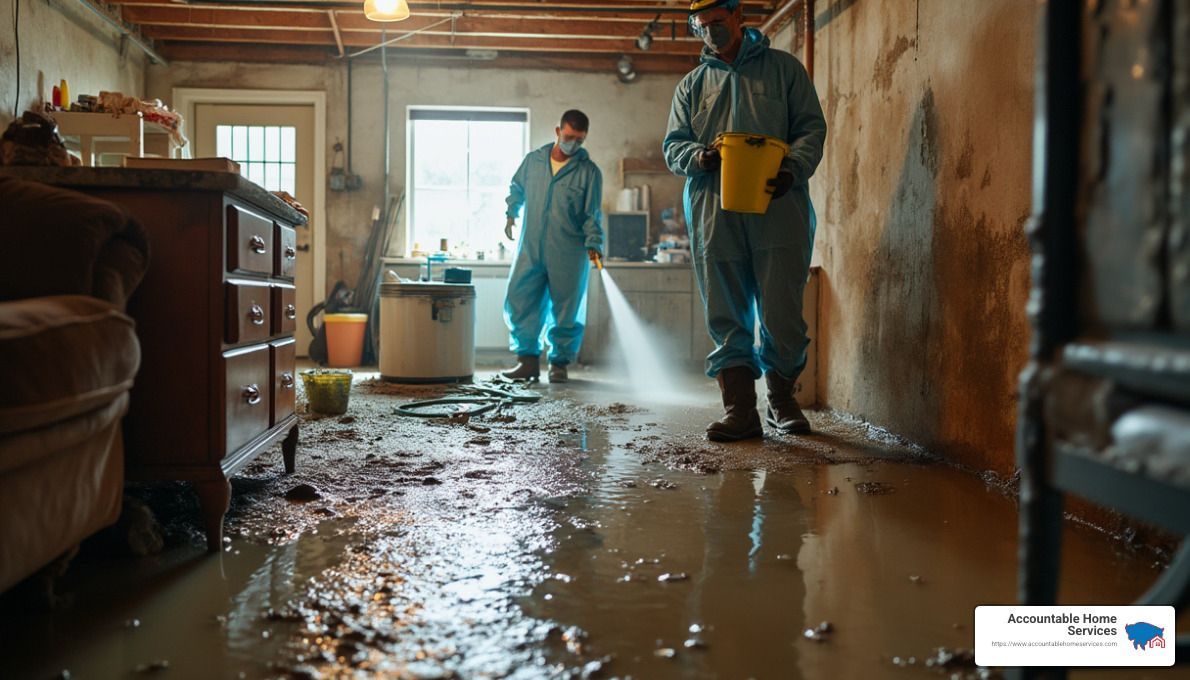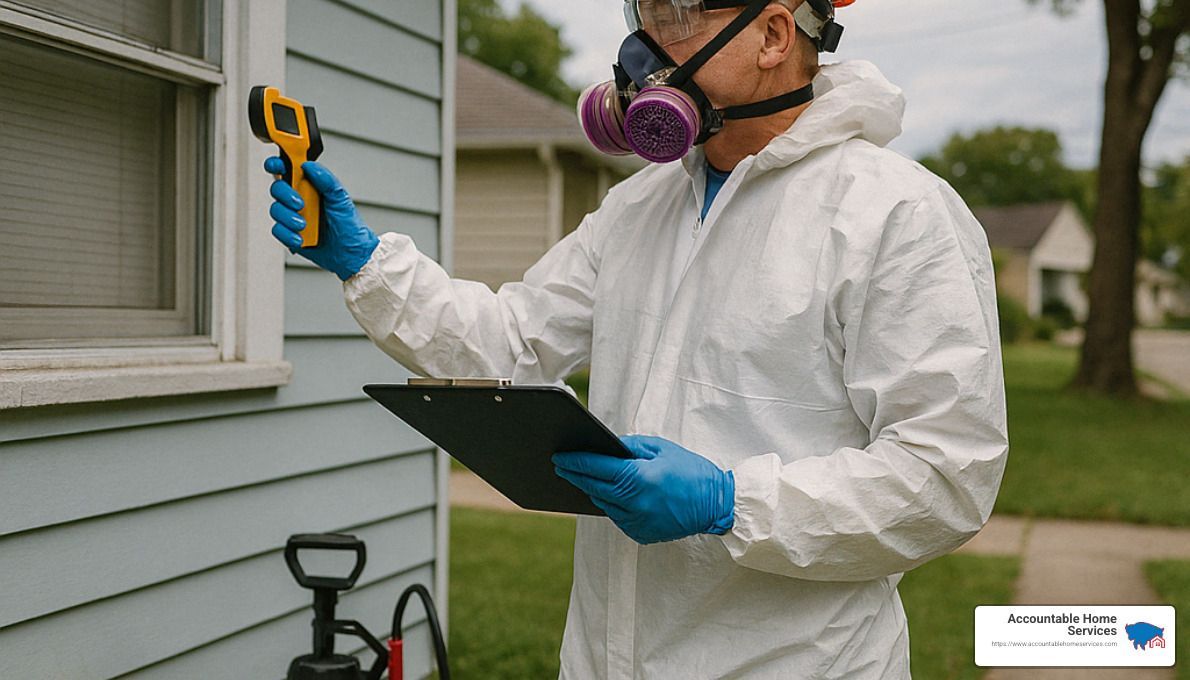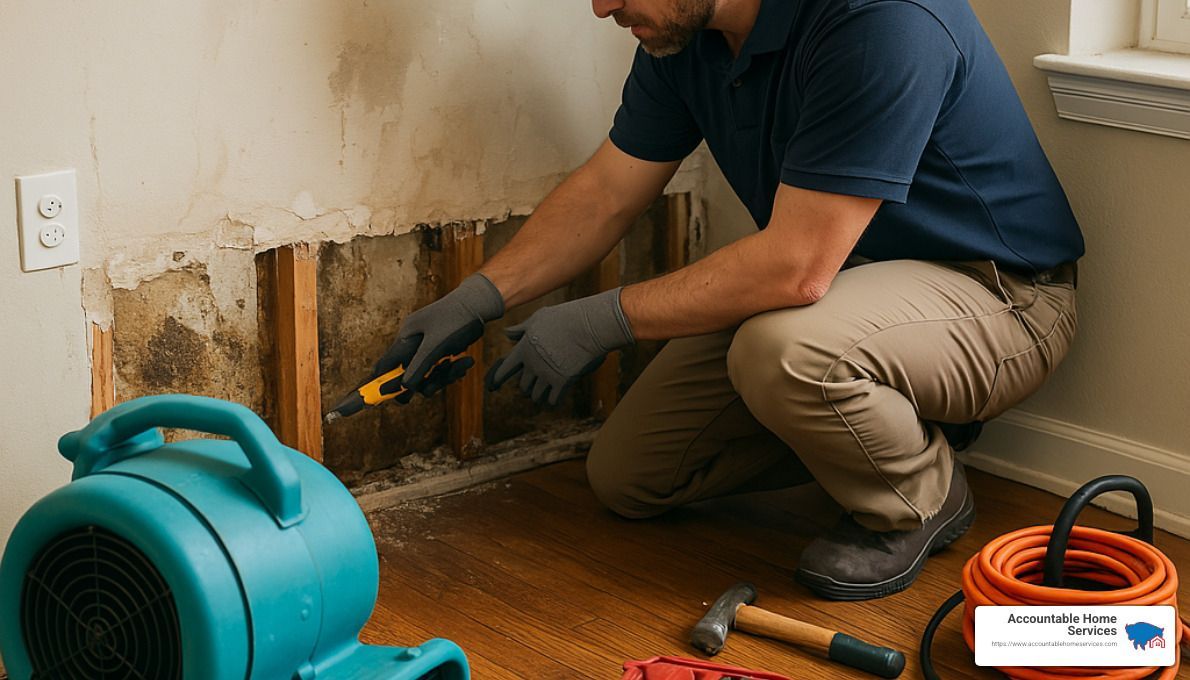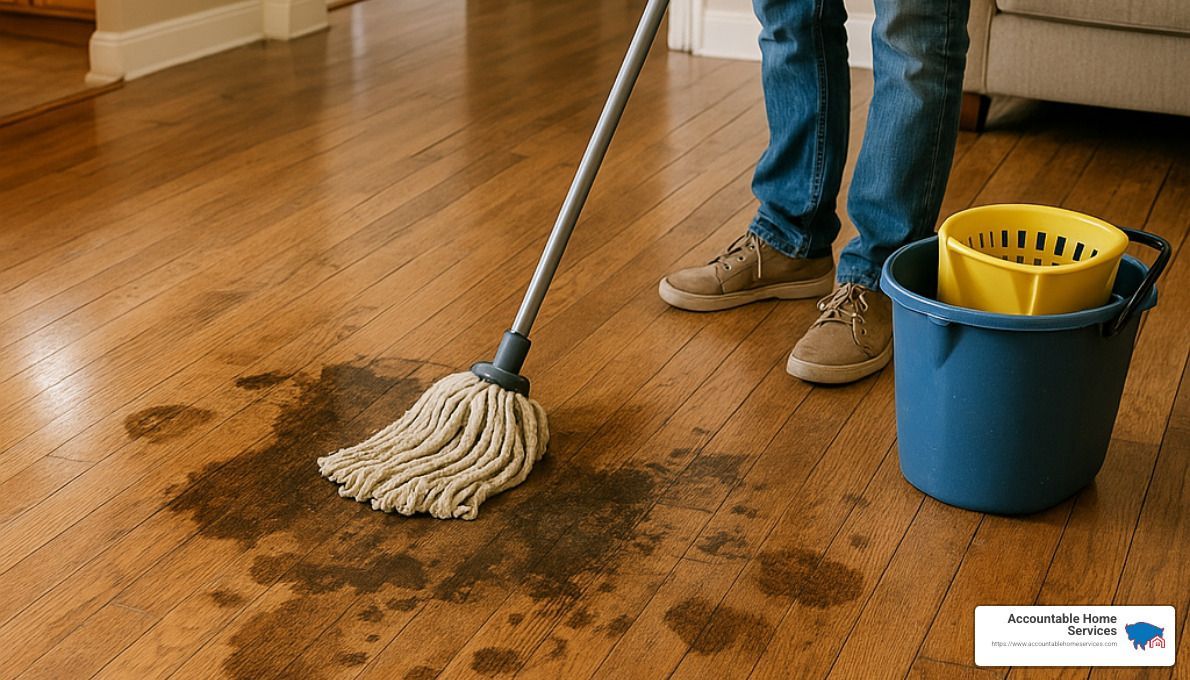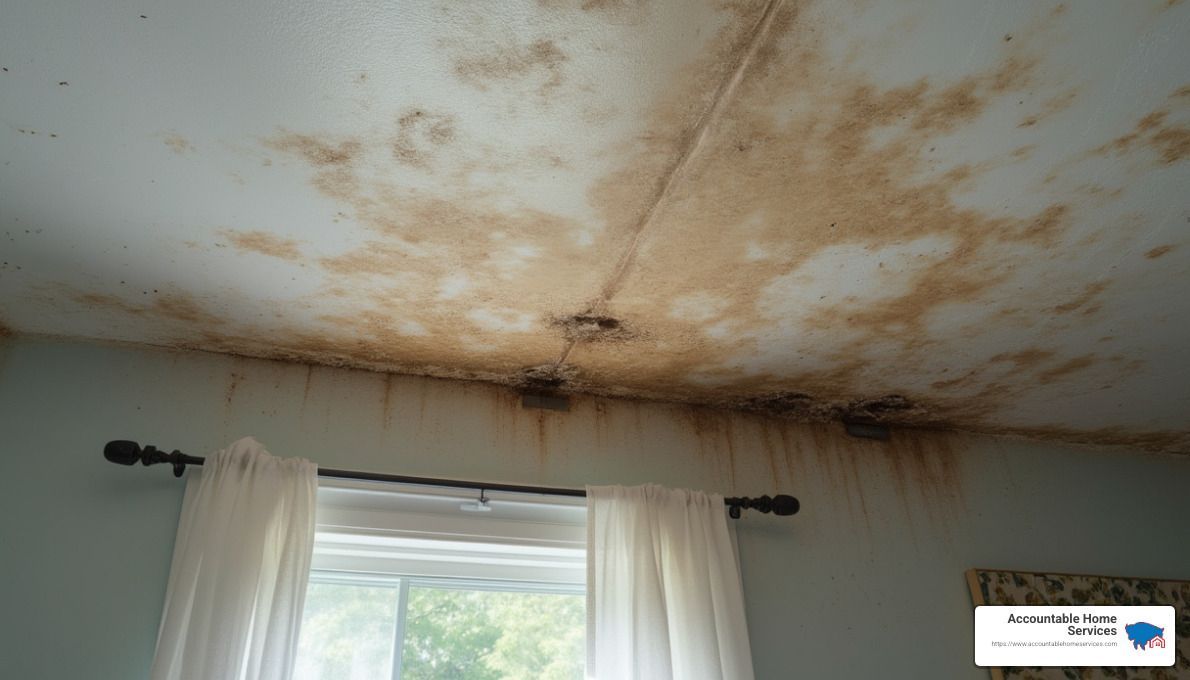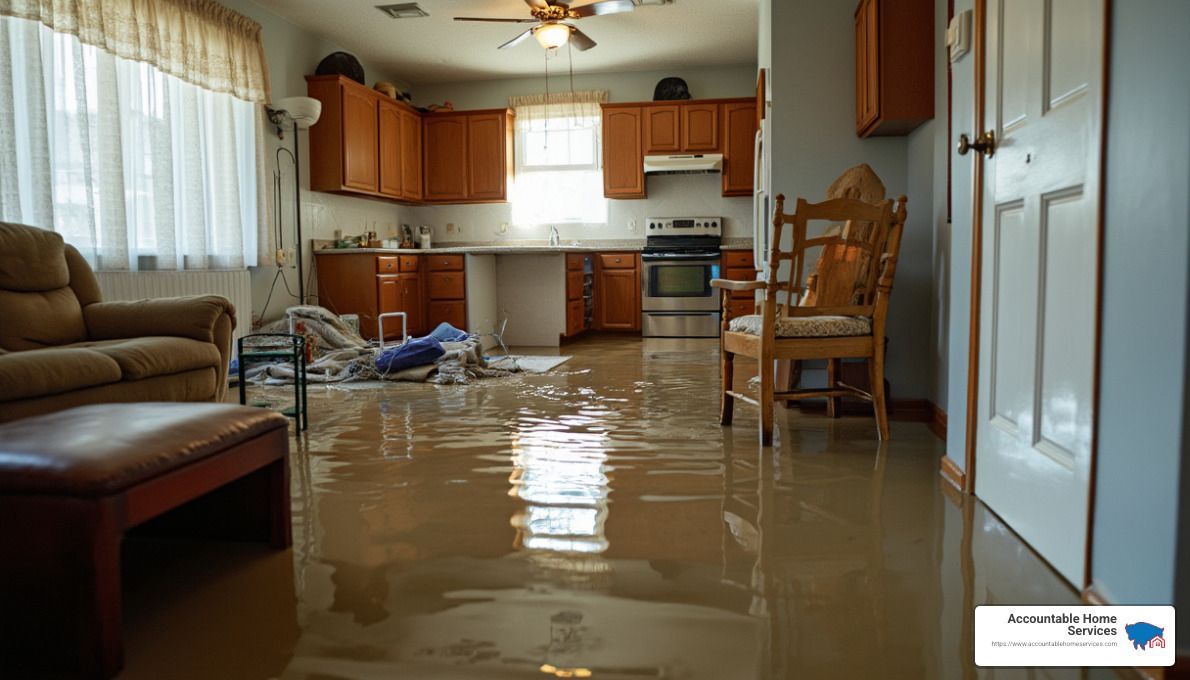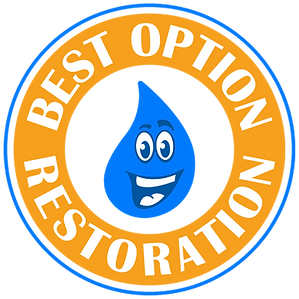Blog

Contractors working with insurance companies play a pivotal role in the restoration process after property damage. Whether it's fixing water damage or rebuilding after a fire, contractors are at the heart of bringing a property back to its original state. We'll explore the key elements of this relationship and what both contractors and property owners need to know.
- Contractors are crucial for repairs in insurance claims.
- Insurance companies may suggest preferred service providers.
- Property owners still have the final say in choosing their contractor.
- Restoration contractors specialize in damage from natural disasters and other perils.
I'm Mike Martinez, owner of Accountable Home Services. With years of experience in helping homeowners restore their properties, I'm here to guide you on how
contractors working with insurance companies can streamline your restoration and repair processes.
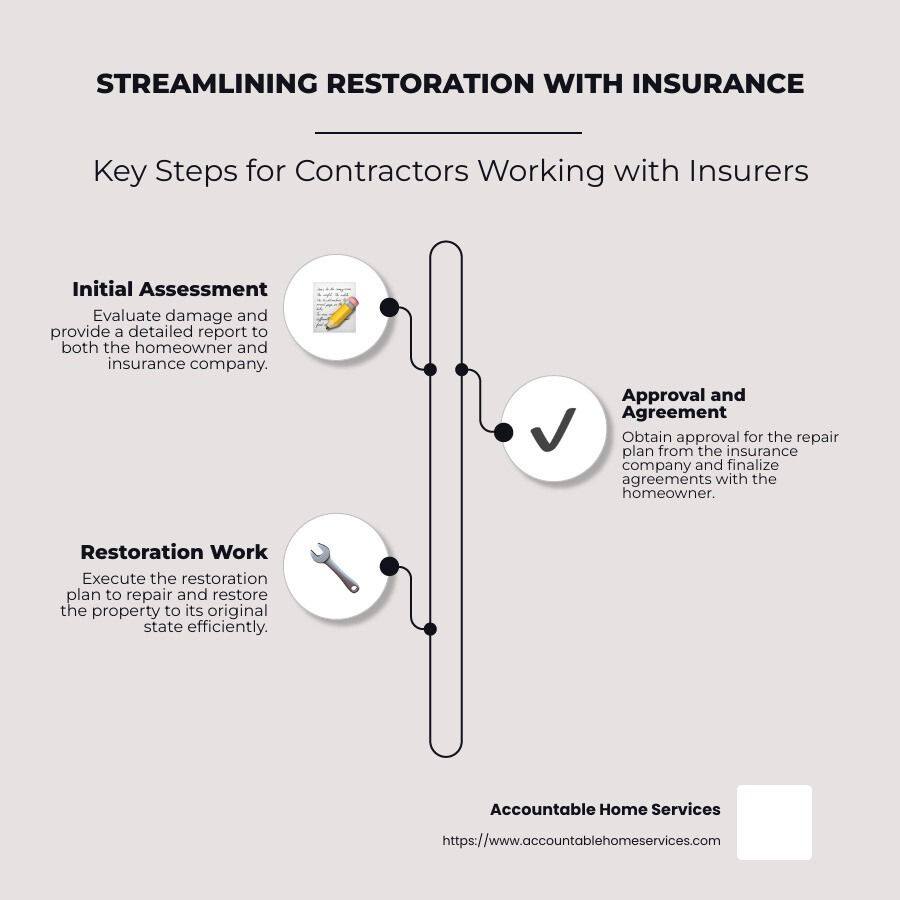
Understanding the Relationship Between Contractors and Insurance Companies
Navigating insurance claims can be overwhelming. Understanding how
contractors work with insurance companies can make the process smoother for everyone involved.
Contractors and Insurance Companies: A Symbiotic Relationship
Contractors are the backbone of restoration efforts after property damage. They bring expertise and efficiency to the table, ensuring repairs are done right. Insurance companies, on the other hand, provide the financial backing needed for these repairs. Together, they form a partnership that benefits homeowners by restoring properties to their former glory.
Insurance companies often have a list of preferred vendors. These are contractors they trust to deliver high-quality work consistently. Being on this list is a testament to a contractor's reliability and expertise. It means the insurance company has vetted them and found their services to be top-notch.

However, it's important to note that policyholder choice is paramount. Homeowners have the final say in selecting a contractor for their repairs. While insurance companies may suggest preferred vendors, the decision ultimately rests with the property owner. This ensures homeowners feel comfortable and confident in the contractor they choose.
What Makes a Contractor Preferred?
Being a preferred contractor involves more than just doing good work. It requires understanding the intricacies of insurance processes and maintaining open communication with insurance adjusters. Contractors who excel in these areas often find themselves on the preferred list.
Here's what makes a contractor stand out to insurance companies:
- Consistent quality work: Delivering exceptional results time and again.
- Understanding insurance processes: Knowing how to steer claims and paperwork efficiently.
- Customer satisfaction: Prioritizing the homeowner's needs and ensuring a smooth experience.
The Homeowner's Role
While insurance companies and contractors handle the bulk of the work, homeowners play a crucial role. They must manage the contract and ensure all work aligns with what the insurance policy covers. It's essential to verify that the contractor has the necessary licenses and insurance coverage.
The contract is between the homeowner and the contractor. Once the insurance company pays out the claim, they have no further responsibility for the contractor's work quality or any delays that might occur.
By understanding these dynamics, homeowners can make informed decisions and ensure their property is restored efficiently and effectively.
Types of Contractors in Insurance Claims
When it comes to insurance claims, not all contractors are created equal. Understanding the differences between general contractors and restoration contractors is key to ensuring your property is in the right hands.
General Contractors vs. Restoration Contractors
General contractors are like the Swiss Army knives of the construction world. They handle a wide range of projects, from building new homes to remodeling kitchens. Their expertise is broad, but they may not have the specialized skills needed for certain insurance claims.
On the other hand, restoration contractors are specialists. They focus on restoring properties damaged by water, wind, fires, and other disasters. This makes them a top choice for insurance claims, especially when quick action is needed.
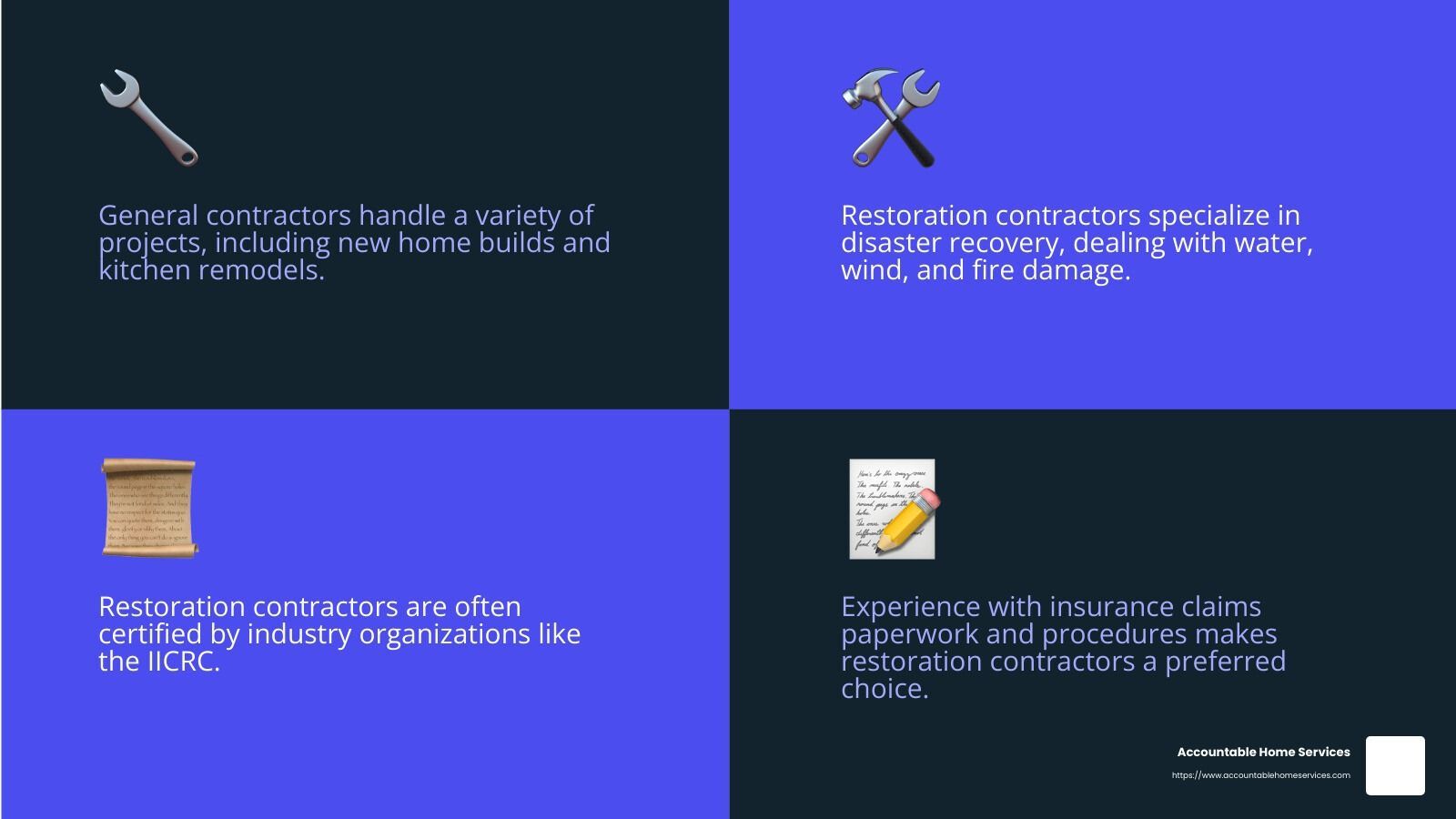
Why choose a restoration contractor?
- Specialized Equipment:
They have the tools and technology designed for disaster recovery, such as dehumidifiers for water damage or thermal cameras for detecting hidden moisture.
- Certification and Licensing: Restoration contractors are often certified by organizations like the IICRC. This means they meet industry standards for handling specific types of damage.
- Insurance Experience: They are familiar with the paperwork and procedures involved in insurance claims, making the process smoother for homeowners.
Specialized Equipment: A Game Changer
The right equipment can make all the difference in restoration work. Restoration contractors often use specialized equipment that general contractors might not have. This includes:
- Thermal Imaging Cameras: For detecting hidden water damage behind walls or under floors.
- Industrial-Grade Dehumidifiers: Essential for drying out properties after water damage.
- Air Scrubbers: These remove airborne contaminants, crucial for fire or mold damage.
Such equipment ensures that the restoration work is thorough and meets insurance standards.
Choosing the Right Contractor
The choice between a general and restoration contractor depends on the nature of the damage. For routine repairs or renovations, a general contractor might suffice. But for complex insurance claims, a restoration contractor's specialized skills and equipment are invaluable.
Homeowners should always verify the contractor's credentials, ensuring they have the necessary licenses and certifications for the job. This not only guarantees quality work but also protects against liability in case of any issues during the restoration process.
By understanding the differences between these types of contractors, homeowners can make informed decisions and ensure their property is restored to its best possible condition.
How to Become a Preferred Contractor for Insurance Companies
Becoming a
preferred contractor
for insurance companies can open doors to a steady stream of work and boost your reputation in the industry. Here's how you can get there:
Preferred Service Providers
Insurance companies often have a list of preferred service providers. These are contractors they trust to handle claims efficiently and effectively. To get on this list, you need to demonstrate reliability, high-quality work, and an understanding of insurance processes.
Steps to Get Listed:
- Build a Solid Reputation:
Deliver outstanding service consistently. Collect positive reviews and testimonials from satisfied clients.
- Understand Insurance Requirements: Familiarize yourself with the specific processes and paperwork each insurance company requires. This shows you're ready to work within their system.
- Network with Insurance Professionals: Attend industry events, join professional associations, and connect with insurance adjusters. Networking can lead to valuable referrals and insights.
- Maintain Necessary Licenses and Insurance: Ensure you're fully licensed and carry adequate insurance coverage. This is non-negotiable for insurance companies.
Building a Working Relationship
Creating a strong working relationship with insurance companies involves more than just being on their list.
Tips for Building Relationships:
- Be Responsive and Communicative: Quick responses and clear communication are key. Insurance companies appreciate contractors who keep them in the loop.
- Show Flexibility: Be adaptable to meet the specific needs and timelines of the insurance company. This flexibility can set you apart.
- Deliver Quality Work Consistently:
Over-deliver on your promises. High-quality work ensures repeat business and strengthens your reputation.
Benefits of Being a Preferred Contractor
Once you're a preferred contractor, you'll enjoy several benefits:
- Consistent Work: Insurance companies often have a steady flow of claims, providing a reliable source of projects.
- Improved Reputation: Being trusted by insurance companies improves your standing in the industry, making you more attractive to potential clients.
- Opportunities for Growth: The relationship can lead to more opportunities, including larger projects and partnerships with other industry players.
By following these steps and maintaining high standards, you can position yourself as a top choice for insurance companies, ensuring a stable and prosperous future for your contracting business.
Tips for Contractors Working with Insurance Companies
When you're a contractor working with insurance companies, understanding the process is key. Here are some tips to help you succeed:
Scope of Loss
The scope of loss is a detailed report that outlines the extent of damage and the work needed to restore a property. It's crucial to get this right.
- Document Everything: Take photos and videos of the damage. This helps you and the insurance adjusters see the full picture.
- Be Thorough: Don't just focus on major damage. Look for smaller issues that might be overlooked. This shows your attention to detail and can help in getting a comprehensive claim.
- Communicate Clearly:
Discuss the scope of loss with the homeowner and the insurance company. Make sure everyone agrees on the work needed.
Written Agreements
Having clear, written agreements is vital when dealing with insurance claims.
- Use Detailed Contracts: Outline all work to be done, costs, and timelines. This protects both you and the homeowner.
- Include Contingencies: Sometimes, unexpected issues arise. Make sure your contract covers how these will be handled.
- Get Approvals: Ensure any changes to the original scope are approved in writing by both the homeowner and the insurance company.
Verifying Credentials
Insurance companies and homeowners need to trust that you're qualified to do the job.
- Maintain Licenses and Certifications: Keep your licenses up to date and ensure you have the necessary certifications for specialized work.
- Show Proof of Insurance: Have liability and workers' compensation insurance. This reassures both the homeowner and the insurance company that you're covered.
- Provide References: Offer testimonials or references from past clients. This builds trust and demonstrates your track record of quality work.
By focusing on these areas, you can build strong relationships with insurance companies and homeowners, leading to more successful projects and a positive reputation in the industry.
Frequently Asked Questions about Contractors and Insurance Companies
Do insurance companies have preferred contractors?
Yes, many insurance companies maintain a list of preferred vendors or contractors. These are professionals they have worked with before and trust to do a good job. Being on this list can be beneficial for contractors, as it often leads to more business opportunities. However, homeowners are not required to choose from this list. They have the freedom to select any contractor they feel comfortable with.
Advantages of Choosing a Preferred Contractor:
- Familiarity with Insurance Processes: Preferred contractors know how to work with insurance companies, which can speed up approvals and payments.
- Established Relationship: Since these contractors have a history with the insurer, any additional costs or changes in the project are likely to be processed more smoothly.
What should homeowners consider when hiring a contractor?
When selecting a contractor, it's important to look beyond just the price. Here are some key factors to consider:
- Verify Credentials: Always check that the contractor is licensed and insured. Ask for a "Certificate of Insurance" to confirm this.
- Review the Insurance Estimate: Make sure the contractor's estimate aligns with the insurance company's scope of loss. This ensures you're covered for all necessary repairs.
- Get a Written Agreement: Before starting any work, have a detailed contract in place. This should outline the scope of work, timeline, costs, and any warranties.
- Check References: Contact previous clients to learn about their experiences. This can provide insight into the contractor's reliability and quality of work.
Are contractors responsible for adjusting claims?
No, contractors are not responsible for adjusting insurance claims. This is known as the unauthorized practice of public adjusting, and it can lead to complications. Only licensed public adjusters or the insurance company's adjusters should handle claim adjustments.
Role of Public Adjusters:
- Advocate for Homeowners: Public adjusters represent the homeowner, ensuring they receive a fair settlement from the insurance company.
- Commission-Based: They typically work on a commission basis, getting paid only if the homeowner receives a payout. This aligns their interests with the homeowner's.
Homeowners should be cautious and ensure that their chosen contractor understands these boundaries. This helps avoid potential issues and ensures a smoother claims process.
By keeping these FAQs in mind, both contractors and homeowners can steer the insurance claims process more effectively, leading to successful property restoration and satisfied clients.
Conclusion
At
Accountable Home Services, we understand the challenges and complexities that come with restoration and remodeling, especially when dealing with insurance claims. Our goal is to be a trusted partner for homeowners navigating these waters, offering reliable, high-quality solutions custom to their needs.
Why Choose Us?
- Family-Owned Integrity: As a family-owned business, we prioritize service, integrity, and excellence in every project. We know trust is crucial, especially when restoring your home after damage.
- Comprehensive Services: From fire and water damage restoration to mold and asbestos remediation, our certified technicians are equipped to handle it all. We also offer full-service remodeling to improve your home beyond its original state.
- Insurance Expertise: We work directly with your insurance company to ensure that you get the maximum coverage possible, reducing stress and financial burden. Our familiarity with insurance processes means faster approvals and smoother projects.
- Emergency Response: We offer 24/7 emergency services to address urgent needs promptly, minimizing further damage and facilitating quicker recovery.
- Transparent Communication: We believe in keeping our clients informed every step of the way. From initial consultation to project completion, our open communication ensures that there are no surprises.
By choosing Accountable Home Services, you're not just hiring a contractor; you're gaining a partner dedicated to restoring your home to its best condition. Our commitment to quality craftsmanship and customer satisfaction makes us the go-to choice for restoration and remodeling in the Denver Metro Area.
For more information about our services, visit our services page.
Thank you for considering us as your trusted partner in restoration and remodeling. We look forward to helping you restore your home and peace of mind.


